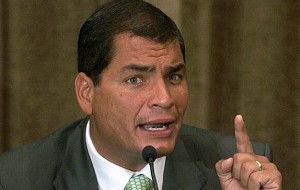MercoPress. South Atlantic News Agency
Controversial media law approved in Ecuador conditions freedom of the press
 President Correa has brought stability to Ecuador but loathes criticism
President Correa has brought stability to Ecuador but loathes criticism Creating official media overseers, imposing sanctions for smearing “people's good name” and limiting private media to one third of radio and TV licenses, Ecuador's congress on Friday passed a restrictive new media law championed by President Rafael Correa.
The country's privately owned media, which is largely in opposition hands, joined press freedom groups in calling the bill an authoritarian measure to control dissent. It passed by a 108-26 margin in the Correa-controlled congress.
Its sponsor, lawmaker Mauro Andino, said the proposal would protect freedom of speech, but “with a focus on everybody's rights, not just for a group of the privileged.”
Carlos Lauria, Americas director of the New York-based Committee for the Protection of Journalists, said the legislation “could severely limited freedom of expression” by giving the government ample discretion to sanction dissenters and thus “opens the door to government censorship of the press.”
It “establishes finally one of the key objectives of Correa's rule, which is to silence critics of his government.”
Diego Cornejo, director of the Ecuadorian Association of Newspaper Editors, said the bill creates “a kind of information totalitarianism,” reflecting a state that “wants to impose only one viewpoint about reality”.
Among provisions in the bill's 119 articles is the prohibition of the “media lynching,” defined as having the effect of damaging a person or institution's prestige or public credibility without sufficient foundation.
The bill, which Correa is expected to sign into law, creates a series of government commissions empowered to exact civil and criminal sanctions against journalists who its members deem to violate the standards set by the law.
It also specifies that Ecuador's broadcasting spectrum be redistributed so that state-run media control 33% of frequencies while community and other grassroots radio stations control 34%, leaving the rest to private media.
The measures are similar to ones enacted in Venezuela under the late President Hugo Chavez, a Correa ally. Like Chavez and his heirs, Correa has used loyal institutions including the courts to try to squelch opposition voices.
Correa is also leading a campaign among allied governments in the region to limit the jurisdiction of the special rapporteur at the Inter-American Commission on Human Rights, who has been highly critical of his government.
President Correa who is highly popular for his generous social spending was re-elected to a third term in February.




Top Comments
Disclaimer & comment rules-

-

-

Read all commentsCome on Assange where's the wikileaks on your new home?
Jun 16th, 2013 - 08:27 pm 0Funnily enough you would fall foul of these laws if you were what you say you are. So lucky you are in cozy with the government I guess.
Apparently they must take these drastic actions because freedoms like these offer alternative points of views. I would j=guess the other countries that will toss the Inter-American Commission on Human Rights out on their asses are bolivia, venezuela, argentina .....50/50 on brazil. Every one has freedom of expression as long as they agree on one point of view. As the PA countries move ahead, these dictocracies will flounder and ultimately fall in to chaos again.
Jun 16th, 2013 - 09:57 pm 0Agreed Captain Poppy. These governments fail to realise that something as simple as free media can impact them economically. If I had a choice to invest in countries that restrict speech and have encroaching government control (Bolivar Alliance and Mercosur) and those that are moving in the opposite direction (Pacific Alliance), then I would choose the latter.
Jun 17th, 2013 - 01:19 am 0Which seems to be what is happening.
Commenting for this story is now closed.
If you have a Facebook account, become a fan and comment on our Facebook Page!